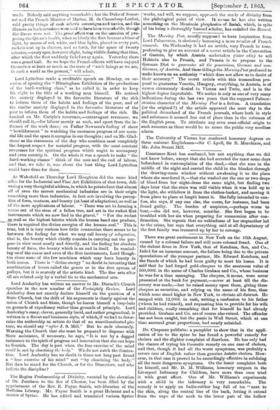Lord Lyttelton made a creditable speech on Monday, on oc-
casion of opening the "Birmingham Exhibition of the productions of the hard-working class," as he called it, in order to keep his right to the title of a working man himself. He noticed the anxiety displayed in the favourite literature of the rich to inform them of the habits and feelings of the poor, and of the similar anxiety displayed in the favourite literature of the poor to inform them of the habits and feelings of the rich. He touched ou Mr. Carlyle's reverence,—extravagant reverence, we should call it,—for labour merely as such, and apart from the in- fluence of the work done ; on Father Newman's feeling of sheer " bewilderment " in watching the enormous program of our mate- rial life and the space it occupies in our thoughts ; and on Mr. Glad- stone as the statesman of the day who combines most completely the deepest respect for material progress, with the most constant reverence for the spiritual progress which ought to accompany and even outstrip it. On the whole it was a speech to make "the hard-working classes" think of the uses and the end of labour, and that, we take it, was about the best thing Lord Lyttelton could have done for them.






























 Previous page
Previous page